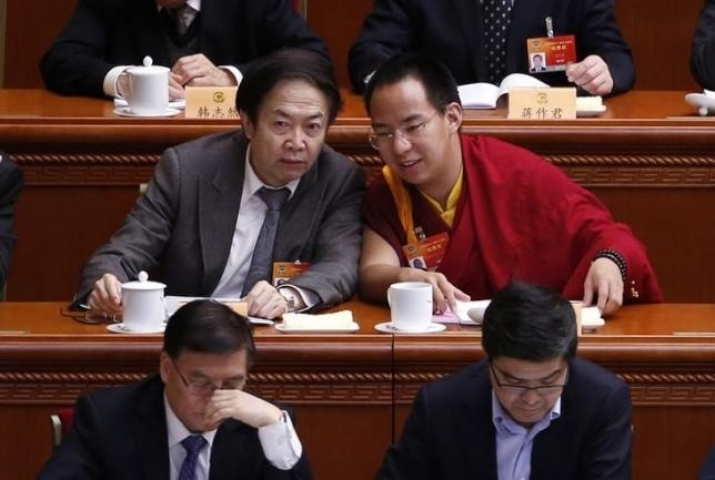NEWS
Beijing-approved Panchen Lama Urges Tighter Restrictions on Buddhist Monks in China
 Gyaltsen Norbu, right, speaks with a delegate at the opening of the third plenary meeting of the Chinese People’s Political Consultative Conference in March. From reuters.com
Gyaltsen Norbu, right, speaks with a delegate at the opening of the third plenary meeting of the Chinese People’s Political Consultative Conference in March. From reuters.comIn a rare public statement, Gyaltsen Norbu, appointed by Beijing as the 11th Panchen Lama, has called for tighter controls on peregrine monks to ensure they follow the Buddha’s teachings. He was speaking at the Fourth World Buddhist Forum, which was held in the city of Wuxi, near Shanghai, from 24–25 October.
“Roaming monks not based at any one temple are particularly prone to breaking precepts,” he said. “It would also be difficult for any other authority or the police to seize them if they do not break the law.” (Phayul.com)
Gyaltsen Norbu’s remark underlines Beijing’s desire for strict controls over Tibetan Buddhism in China and its increasingly stringent management of Buddhist monks in ethnically Tibetan regions of the country—particularly difficult in the case of transient monks, who spend a lot of time away from monasteries. The authorities have introduced a raft of new rules and policies in recent years to govern activities at Tibetan Buddhist monasteries, all of which now have a police presence.
“Controls on religion inside Tibet have intensified, especially after 2008,” observed Tsering Tsomo, executive director of the Tibetan Center for Human Rights and Democracy in Dharamsala, northern India. “Why are they doing this? There is a reason: these are efforts to secularize monks.” (UCA News)
Gyaltsen Norbu’s comment can also be seen as a return to the party line following a speech in March in which he warned that government quotas on the number of Tibetan monks and nuns permitted to reside at a particular monastery—a rarely acknowledged open secret—represented “a danger of Buddhism existing in name only.” However, some analysts noted that the Communist Party would have vetted the speech in advance. (UCA News)
In recent years, Beijing has insisted that Tibetan monks adhere to the Buddhist precepts. Officials and state media outlets have issued warnings that the recent spate of Tibetan self-immolations in protest of Chinese rule—of which there are reported to have been at least 140 incidents since an uprising in 2008—go against the Buddhist teachings.
Twenty-five-year-old Gyaltsen Norbu currently serves as the vice president of the Buddhist Association of China and is a member of the National Committee of the Chinese People's Political Consultative Conference—China’s top political advisory body.
Gyaltsen Norbu was handpicked by the Chinese government in November 1995 over Gendun Choekyi Nyima, a six-year-old boy already recognized by His Holiness the Dalai Lama as the reincarnation of the 10th Panchen Lama on 14 May 1995. Just three days later, on 17 May, Nyima was taken into custody by the Chinese authorities, along with members of his family, and has not been seen in public since. Many Tibetans refuse to recognize Gyaltsen Norbu as a true incarnation of the Panchen Lama, believing the abduction was part of a plan by Beijing to dictate the choice of the next Dalai Lama, as the Panchen Lama traditionally plays a key role in recognizing the Dalai Lama’s incarnations.
The Chinese government last month admitted for the first time in 20 years that Nyima was alive. Norbu Dunzhub, a member of the Tibet Autonomous Region’s United Front Work Department, said, “The reincarnated child Panchen Lama you mentioned is being educated, living a normal life, growing up healthily and does not wish to be disturbed.” (Phayul.com)
The Panchen Lama (a title meaning “great scholar”) is the second-most senior figure in Tibetan Buddhism after the Dalai Lama. The successive incarnations of the Panchen Lama form a tulku lineage believed to be incarnations of Amitabha Buddha. The 10th Panchen Lama was imprisoned in 1962 after writing a report criticizing the starvation of Tibetans due to collectivization and disastrous crop policies during China’s “Great Leap Forward.” He was released in the 1980s and died in Tibet on 28 January 1989.
See more
China picked Panchen Lama calls for tighter control on monks (Phayul.com)
Panchen Lama calls for stricter measures on Buddhist monks (UCA News)
Twenty Years On, China Says Panchen Lama “Living a Normal Life” (Buddhistdoor Global)














